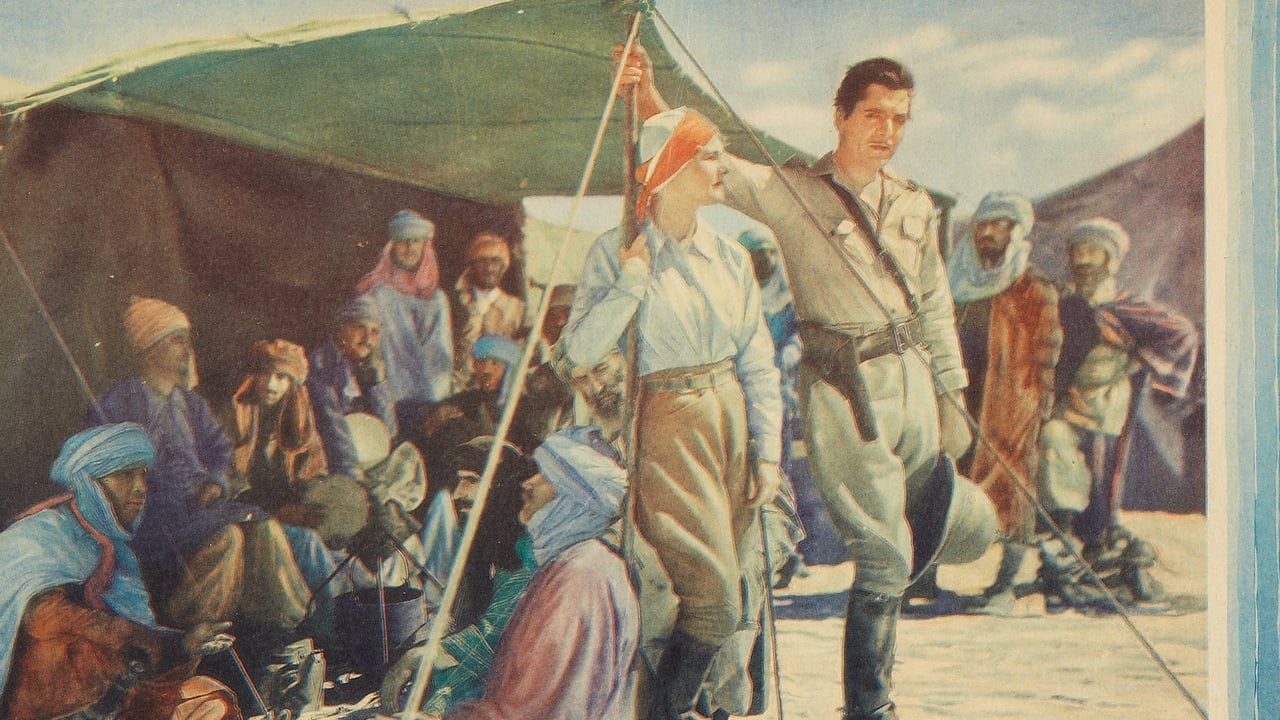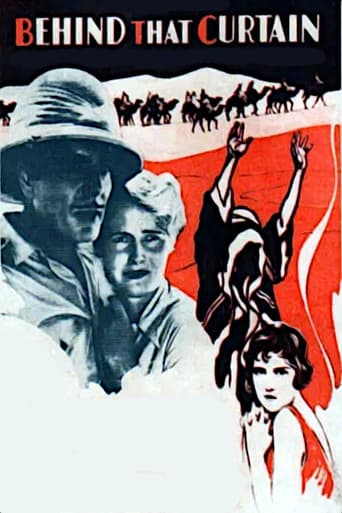

This film is of historical interest, as the first appearance on film of the Charlie Chan character, even though he doesn't appear until about 50 minutes into the movie, and is in only 3 scenes. But as a movie, it is almost intolerably bad. The actors were obviously very unsure of themselves, making the transition from silent to sound movies. I've seen Warner Baxter in silent films, and he was by no means as frozen as he was in this movie. Now and then he relaxes, and his dialog becomes a bit more natural, as it would be a few years later in a film like "42nd Street". But here, he seems flummoxed by the need to actually MEMORIZE lines - there are several moments where he speaks hesitantly, for all the world as if he just couldn't remember the line, and can no longer just say whatever he wants, as one could in a silent film.Baxter is not the worst offender - the character of Mr. Galt (destined to play the melancholy role of "The Body") speaks so slowly and with such exaggerated pronunciation, is just terrible. Many of the actors appeared to be falling back on stage performance techniques, with loud emoting and over-enunciation, and as a result they over-powered the camera - or they would have, if their loud, artificial voices hadn't been combined with near-immobility. Everyone seems afraid to move - they plant themselves in one spot, then roar out their lines.The camera-work is also very unimaginative for the most part, with one notable exception - the camel caravan traveling over the desert was quite beautifully photographed. It's probably not a coincidence that the scene was purely visual - when the filmmakers could fall back on the more familiar silent movie techniques, they seemed much freer and imaginative. The new technology, by contrast, introduced awkwardness and seemed burdensome.The plot and the script were both very lame. The murderer is revealed very quickly, and mystery is replaced by a love triangle and a romance. Eve, the heroine, overacts horribly, with lots of head-bobbing and wriggling to convey her anguish. Her motivation is completely unbelievable - married to a murdering psychopath who has every reason in the world to kill her, she persists in fleeing from the police, and refusing to help convict him, even when her own life is at stake, and the police have hard evidence anyway, and there is no chance he can escape justice.The script does deserve some credit for treating a theme like adultery in a rather surprisingly hard-edged way. There's no softening of the despicable betrayal, or of the heroine's painful discovery that her husband has been sleeping with their Indian maid - she even finds the latter's earring in her own bed! She has her own moment of temptation later on, but resists with the time-honored line, "After all, he IS my husband!" It's a good reminder that the '20s were by no means a strait-laced decade - the tasteful expunging of sex in the movies came later. But then the movie ruins it by having Eve shrinking from divorcing her cad of a husband (one of my favorite lines, by the way: "Are-you-going-to------DIVORCE------me???") because she is afraid of the scandal. Divorce wasn't THAT big a scandal in the '20s, especially among the rich. Eve is always veering between put-upon, shrinking damsel in distress and unpredictable, capable woman on her own. The movie would have been far better if she had been portrayed as a strong, modern woman throughout, but that Eve would never have been so stupid and sentimental as to leave a murderer roaming the streets.
... View MoreWhen Fox decided to make "Behind That Curtain," the studio picked as leads Warner Baxter, Lois Moran and Gilbert Emery. Of the three, Emery's role was the most important, since his actions kept the story moving to its eventual outcome in San Francisco. Although the scriptwriters gave Gilbert Emery terrible lines for his part as an upper class Englishman, Emery can take all the credit for his strange pseudo-British accent as he slowly enunciates every word of dialogue, pausing at every chance to lend gravity to the moronic dialogue. At about the 80 minute mark, Emery's character discusses a plan with Charlie Chan of the SFPD. In one exchange, both actors talked in exactly the same way, as if they memorized their dialogue phonetically. Unlike E.L. Park, the actor who played Chan, for Emery English was not a second language, but it sure sounded that way. At 90 minutes, this movie is about 30 minutes too long. Had the producer just cut out Emery's part entirely, this movie would have been much better. The story would still have been a mess, with the characters played by Warner Baxter and Lois Moran traveling in the desert with camels, for no reason I can see, except to save money on sets. Lois Moran has the best scene in the picture, as she runs through San Francisco while passersby look at her. This apparent cinema verite look at 1929 San Francisco is interesting, but not long enough. Maybe if there were more running scenes with Lois Moran, they could have renamed the picture "Run, Lois, Run." It is beyond me how Gilbert Emery could continue to have a career in Hollywood, while John Gilbert was almost laughed off the screen for having a voice with the wrong pitch for the roles John Gilbert first played in talkies.
... View MoreAn international orientalizing romance mystery from the pen of Earl Derr Biggers, author of the Charlie Chan mysteries. Chan is not really in this movie, except indirectlyinstead there is a British-explorers-in-the-East theme, India and Persia and Tehran and pith helmets. Eve Mannering (Lois Moran) has married the wrong man, Durand (Philip Strange), who is a bounder and who has killed an agent, Hillary Galt, to prevent Eve's uncle from finding out. A watchman, blackmailing him, writes to Eve in India, and she confronts her husband, who hurts her and acts threatening, so she disappears into the desert with dashing, dependable Col Beetham (Warner Baxter) who has been longing for her all his life. Meanwhile, the urbane Scotland Yard detective Sir Frederick Bruce (Gilbert Emery) pursues the mystery with a clue provided by Chan, and the story winds up in San Francisco will all wrinkles ironed out. A very early sound movie, this one is marred not so much by the spotty sound recording as by the stagy acting style: thrilling and plummy tones ("ohhhhhhhhh Erik!") from Moran and Baxter. She's sometimes quite winsome, and Boris Karloff has a tiny part as Beetham's oriental servant. Later films focus on Chan, but not this one. Interesting use of title phrase, first to indicate why explorers explore, and then to preface Beetham's film-illustrated lecture at the denouement.
... View MoreOther than being based on a story by Earl Derr Biggers, this film offers little in the way of mainstream Charlie Chan familiarity, even down to the portrayal of the Oriental Detective by Asian actor E.L. Park in the closing minutes of the film. By then, the mystery behind the murder of Hilary Galt is no mystery at all, as one's early suspicion of Eric Durand (Philip Strange) behind the deed is confirmed a number of times as the movie proceeds.More so, the film involves a love triangle between Durand, his wife Eve Mannering (Lois Moran), and jilted lover Colonel John Beetham (Warner Baxter). Presumably, Galt had information for Eve's uncle Sir George Mannering (Claude King) that would threaten the marriage, so Durand enters Galt's study, murders him, and places a pair of slippers on Galt that were once connected to Beetham. However Durand was observed leaving Galt's study by night watchman Alfred Pornick (John Rogers), who attempts to blackmail Durand with the information. Eve learns of her husband's involvement in the murder, and runs to Beetham for comfort and support, not to mention his help in running away from Eric.As an early talkie film, the movie suffers from it's actors trying to find their place in a new medium. The players seem to over enunciate and over emphasize their dialog, almost to the point of extreme tedium. From today's vantage point it would seem like they were purposely going for "over the top" in their performances. It's especially apparent as the movie progresses; for example in the Persian Desert scene when Eve finally gives in to her feelings for Beetham, she drags on with a simple sentence - "Whatever....happens....John,....remember,....I....love...you".If you need a reason to watch the film, consider the appearance of a young Boris Karloff in a pre-Frankenstein role as Beetham's Indian servant. He's not given much to do, but his stamp on the film is undeniable, particularly in a scene when ordered by Beetham to protect his lady's secrecy. Karloff plays dumb in two different languages by saying nothing.Ultimately, the film stands as a curiosity piece for Charlie Chan fans, and for that reason should be viewed at least once. However one should not expect the usual signature items of a Chan film, such as the Chinese proverbs, the help of numbered sons, or the exposition of the crime solution by Charlie in the finale. In fact, the off screen Chan is virtually derided by Scotland Yard detective Sir Frederick Bruce who handled the case, stating that a tighter surveillance at the Cosmopolitan Club may have captured Eric Durand alive. At the same time though, his satisfaction in closing the case seems to be the over riding sentiment.
... View More